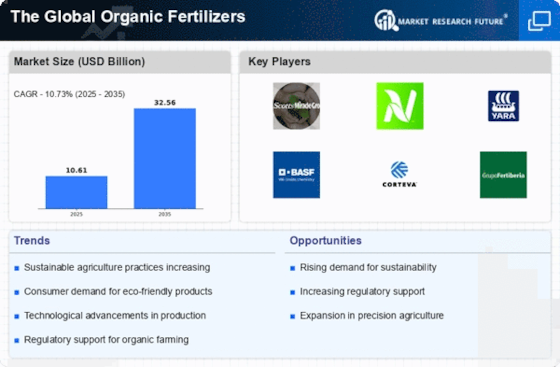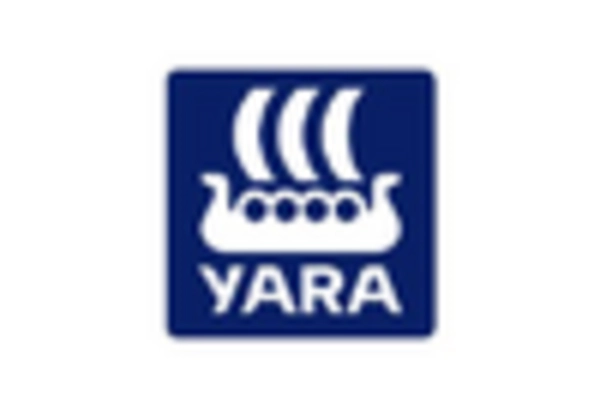Soil Application
Foliar Application
Fertigation
Seed Treatment
Plant-Based
Animal-Based
Microbial-Based
Mineral-Based
Crop Production
Horticulture
Forestry
Landscaping
Granular
Liquid
Powder
North America
Europe
South America
Asia Pacific
Middle East and Africa
North America Outlook (USD Billion, 2019-2035)
North America Organic Fertilizers Market by Application Type
Soil Application
Foliar Application
Fertigation
Seed Treatment
North America Organic Fertilizers Market by Type
Plant-Based
Animal-Based
Microbial-Based
Mineral-Based
North America Organic Fertilizers Market by End Use Type
Crop Production
Horticulture
Forestry
Landscaping
North America Organic Fertilizers Market by Form Type
Granular
Liquid
Powder
North America Organic Fertilizers Market by Regional Type
US
Canada
US Outlook (USD Billion, 2019-2035)
US Organic Fertilizers Market by Application Type
Soil Application
Foliar Application
Fertigation
Seed Treatment
US Organic Fertilizers Market by Type
Plant-Based
Animal-Based
Microbial-Based
Mineral-Based
US Organic Fertilizers Market by End Use Type
Crop Production
Horticulture
Forestry
Landscaping
US Organic Fertilizers Market by Form Type
Granular
Liquid
Powder
CANADA Outlook (USD Billion, 2019-2035)
CANADA Organic Fertilizers Market by Application Type
Soil Application
Foliar Application
Fertigation
Seed Treatment
CANADA Organic Fertilizers Market by Type
Plant-Based
Animal-Based
Microbial-Based
Mineral-Based
CANADA Organic Fertilizers Market by End Use Type
Crop Production
Horticulture
Forestry
Landscaping
CANADA Organic Fertilizers Market by Form Type
Granular
Liquid
Powder
Europe Outlook (USD Billion, 2019-2035)
Europe Organic Fertilizers Market by Application Type
Soil Application
Foliar Application
Fertigation
Seed Treatment
Europe Organic Fertilizers Market by Type
Plant-Based
Animal-Based
Microbial-Based
Mineral-Based
Europe Organic Fertilizers Market by End Use Type
Crop Production
Horticulture
Forestry
Landscaping
Europe Organic Fertilizers Market by Form Type
Granular
Liquid
Powder
Europe Organic Fertilizers Market by Regional Type
Germany
UK
France
Russia
Italy
Spain
Rest of Europe
GERMANY Outlook (USD Billion, 2019-2035)
GERMANY Organic Fertilizers Market by Application Type
Soil Application
Foliar Application
Fertigation
Seed Treatment
GERMANY Organic Fertilizers Market by Type
Plant-Based
Animal-Based
Microbial-Based
Mineral-Based
GERMANY Organic Fertilizers Market by End Use Type
Crop Production
Horticulture
Forestry
Landscaping
GERMANY Organic Fertilizers Market by Form Type
Granular
Liquid
Powder
UK Outlook (USD Billion, 2019-2035)
UK Organic Fertilizers Market by Application Type
Soil Application
Foliar Application
Fertigation
Seed Treatment
UK Organic Fertilizers Market by Type
Plant-Based
Animal-Based
Microbial-Based
Mineral-Based
UK Organic Fertilizers Market by End Use Type
Crop Production
Horticulture
Forestry
Landscaping
UK Organic Fertilizers Market by Form Type
Granular
Liquid
Powder
FRANCE Outlook (USD Billion, 2019-2035)
FRANCE Organic Fertilizers Market by Application Type
Soil Application
Foliar Application
Fertigation
Seed Treatment
FRANCE Organic Fertilizers Market by Type
Plant-Based
Animal-Based
Microbial-Based
Mineral-Based
FRANCE Organic Fertilizers Market by End Use Type
Crop Production
Horticulture
Forestry
Landscaping
FRANCE Organic Fertilizers Market by Form Type
Granular
Liquid
Powder
RUSSIA Outlook (USD Billion, 2019-2035)
RUSSIA Organic Fertilizers Market by Application Type
Soil Application
Foliar Application
Fertigation
Seed Treatment
RUSSIA Organic Fertilizers Market by Type
Plant-Based
Animal-Based
Microbial-Based
Mineral-Based
RUSSIA Organic Fertilizers Market by End Use Type
Crop Production
Horticulture
Forestry
Landscaping
RUSSIA Organic Fertilizers Market by Form Type
Granular
Liquid
Powder
ITALY Outlook (USD Billion, 2019-2035)
ITALY Organic Fertilizers Market by Application Type
Soil Application
Foliar Application
Fertigation
Seed Treatment
ITALY Organic Fertilizers Market by Type
Plant-Based
Animal-Based
Microbial-Based
Mineral-Based
ITALY Organic Fertilizers Market by End Use Type
Crop Production
Horticulture
Forestry
Landscaping
ITALY Organic Fertilizers Market by Form Type
Granular
Liquid
Powder
SPAIN Outlook (USD Billion, 2019-2035)
SPAIN Organic Fertilizers Market by Application Type
Soil Application
Foliar Application
Fertigation
Seed Treatment
SPAIN Organic Fertilizers Market by Type
Plant-Based
Animal-Based
Microbial-Based
Mineral-Based
SPAIN Organic Fertilizers Market by End Use Type
Crop Production
Horticulture
Forestry
Landscaping
SPAIN Organic Fertilizers Market by Form Type
Granular
Liquid
Powder
REST OF EUROPE Outlook (USD Billion, 2019-2035)
REST OF EUROPE Organic Fertilizers Market by Application Type
Soil Application
Foliar Application
Fertigation
Seed Treatment
REST OF EUROPE Organic Fertilizers Market by Type
Plant-Based
Animal-Based
Microbial-Based
Mineral-Based
REST OF EUROPE Organic Fertilizers Market by End Use Type
Crop Production
Horticulture
Forestry
Landscaping
REST OF EUROPE Organic Fertilizers Market by Form Type
Granular
Liquid
Powder
APAC Outlook (USD Billion, 2019-2035)
APAC Organic Fertilizers Market by Application Type
Soil Application
Foliar Application
Fertigation
Seed Treatment
APAC Organic Fertilizers Market by Type
Plant-Based
Animal-Based
Microbial-Based
Mineral-Based
APAC Organic Fertilizers Market by End Use Type
Crop Production
Horticulture
Forestry
Landscaping
APAC Organic Fertilizers Market by Form Type
Granular
Liquid
Powder
APAC Organic Fertilizers Market by Regional Type
China
India
Japan
South Korea
Malaysia
Thailand
Indonesia
Rest of APAC
CHINA Outlook (USD Billion, 2019-2035)
CHINA Organic Fertilizers Market by Application Type
Soil Application
Foliar Application
Fertigation
Seed Treatment
CHINA Organic Fertilizers Market by Type
Plant-Based
Animal-Based
Microbial-Based
Mineral-Based
CHINA Organic Fertilizers Market by End Use Type
Crop Production
Horticulture
Forestry
Landscaping
CHINA Organic Fertilizers Market by Form Type
Granular
Liquid
Powder
INDIA Outlook (USD Billion, 2019-2035)
INDIA Organic Fertilizers Market by Application Type
Soil Application
Foliar Application
Fertigation
Seed Treatment
INDIA Organic Fertilizers Market by Type
Plant-Based
Animal-Based
Microbial-Based
Mineral-Based
INDIA Organic Fertilizers Market by End Use Type
Crop Production
Horticulture
Forestry
Landscaping
INDIA Organic Fertilizers Market by Form Type
Granular
Liquid
Powder
JAPAN Outlook (USD Billion, 2019-2035)
JAPAN Organic Fertilizers Market by Application Type
Soil Application
Foliar Application
Fertigation
Seed Treatment
JAPAN Organic Fertilizers Market by Type
Plant-Based
Animal-Based
Microbial-Based
Mineral-Based
JAPAN Organic Fertilizers Market by End Use Type
Crop Production
Horticulture
Forestry
Landscaping
JAPAN Organic Fertilizers Market by Form Type
Granular
Liquid
Powder
SOUTH KOREA Outlook (USD Billion, 2019-2035)
SOUTH KOREA Organic Fertilizers Market by Application Type
Soil Application
Foliar Application
Fertigation
Seed Treatment
SOUTH KOREA Organic Fertilizers Market by Type
Plant-Based
Animal-Based
Microbial-Based
Mineral-Based
SOUTH KOREA Organic Fertilizers Market by End Use Type
Crop Production
Horticulture
Forestry
Landscaping
SOUTH KOREA Organic Fertilizers Market by Form Type
Granular
Liquid
Powder
MALAYSIA Outlook (USD Billion, 2019-2035)
MALAYSIA Organic Fertilizers Market by Application Type
Soil Application
Foliar Application
Fertigation
Seed Treatment
MALAYSIA Organic Fertilizers Market by Type
Plant-Based
Animal-Based
Microbial-Based
Mineral-Based
MALAYSIA Organic Fertilizers Market by End Use Type
Crop Production
Horticulture
Forestry
Landscaping
MALAYSIA Organic Fertilizers Market by Form Type
Granular
Liquid
Powder
THAILAND Outlook (USD Billion, 2019-2035)
THAILAND Organic Fertilizers Market by Application Type
Soil Application
Foliar Application
Fertigation
Seed Treatment
THAILAND Organic Fertilizers Market by Type
Plant-Based
Animal-Based
Microbial-Based
Mineral-Based
THAILAND Organic Fertilizers Market by End Use Type
Crop Production
Horticulture
Forestry
Landscaping
THAILAND Organic Fertilizers Market by Form Type
Granular
Liquid
Powder
INDONESIA Outlook (USD Billion, 2019-2035)
INDONESIA Organic Fertilizers Market by Application Type
Soil Application
Foliar Application
Fertigation
Seed Treatment
INDONESIA Organic Fertilizers Market by Type
Plant-Based
Animal-Based
Microbial-Based
Mineral-Based
INDONESIA Organic Fertilizers Market by End Use Type
Crop Production
Horticulture
Forestry
Landscaping
INDONESIA Organic Fertilizers Market by Form Type
Granular
Liquid
Powder
REST OF APAC Outlook (USD Billion, 2019-2035)
REST OF APAC Organic Fertilizers Market by Application Type
Soil Application
Foliar Application
Fertigation
Seed Treatment
REST OF APAC Organic Fertilizers Market by Type
Plant-Based
Animal-Based
Microbial-Based
Mineral-Based
REST OF APAC Organic Fertilizers Market by End Use Type
Crop Production
Horticulture
Forestry
Landscaping
REST OF APAC Organic Fertilizers Market by Form Type
Granular
Liquid
Powder
South America Outlook (USD Billion, 2019-2035)
South America Organic Fertilizers Market by Application Type
Soil Application
Foliar Application
Fertigation
Seed Treatment
South America Organic Fertilizers Market by Type
Plant-Based
Animal-Based
Microbial-Based
Mineral-Based
South America Organic Fertilizers Market by End Use Type
Crop Production
Horticulture
Forestry
Landscaping
South America Organic Fertilizers Market by Form Type
Granular
Liquid
Powder
South America Organic Fertilizers Market by Regional Type
Brazil
Mexico
Argentina
Rest of South America
BRAZIL Outlook (USD Billion, 2019-2035)
BRAZIL Organic Fertilizers Market by Application Type
Soil Application
Foliar Application
Fertigation
Seed Treatment
BRAZIL Organic Fertilizers Market by Type
Plant-Based
Animal-Based
Microbial-Based
Mineral-Based
BRAZIL Organic Fertilizers Market by End Use Type
Crop Production
Horticulture
Forestry
Landscaping
BRAZIL Organic Fertilizers Market by Form Type
Granular
Liquid
Powder
MEXICO Outlook (USD Billion, 2019-2035)
MEXICO Organic Fertilizers Market by Application Type
Soil Application
Foliar Application
Fertigation
Seed Treatment
MEXICO Organic Fertilizers Market by Type
Plant-Based
Animal-Based
Microbial-Based
Mineral-Based
MEXICO Organic Fertilizers Market by End Use Type
Crop Production
Horticulture
Forestry
Landscaping
MEXICO Organic Fertilizers Market by Form Type
Granular
Liquid
Powder
ARGENTINA Outlook (USD Billion, 2019-2035)
ARGENTINA Organic Fertilizers Market by Application Type
Soil Application
Foliar Application
Fertigation
Seed Treatment
ARGENTINA Organic Fertilizers Market by Type
Plant-Based
Animal-Based
Microbial-Based
Mineral-Based
ARGENTINA Organic Fertilizers Market by End Use Type
Crop Production
Horticulture
Forestry
Landscaping
ARGENTINA Organic Fertilizers Market by Form Type
Granular
Liquid
Powder
REST OF SOUTH AMERICA Outlook (USD Billion, 2019-2035)
REST OF SOUTH AMERICA Organic Fertilizers Market by Application Type
Soil Application
Foliar Application
Fertigation
Seed Treatment
REST OF SOUTH AMERICA Organic Fertilizers Market by Type
Plant-Based
Animal-Based
Microbial-Based
Mineral-Based
REST OF SOUTH AMERICA Organic Fertilizers Market by End Use Type
Crop Production
Horticulture
Forestry
Landscaping
REST OF SOUTH AMERICA Organic Fertilizers Market by Form Type
Granular
Liquid
Powder
MEA Outlook (USD Billion, 2019-2035)
MEA Organic Fertilizers Market by Application Type
Soil Application
Foliar Application
Fertigation
Seed Treatment
MEA Organic Fertilizers Market by Type
Plant-Based
Animal-Based
Microbial-Based
Mineral-Based
MEA Organic Fertilizers Market by End Use Type
Crop Production
Horticulture
Forestry
Landscaping
MEA Organic Fertilizers Market by Form Type
Granular
Liquid
Powder
MEA Organic Fertilizers Market by Regional Type
GCC Countries
South Africa
Rest of MEA
GCC COUNTRIES Outlook (USD Billion, 2019-2035)
GCC COUNTRIES Organic Fertilizers Market by Application Type
Soil Application
Foliar Application
Fertigation
Seed Treatment
GCC COUNTRIES Organic Fertilizers Market by Type
Plant-Based
Animal-Based
Microbial-Based
Mineral-Based
GCC COUNTRIES Organic Fertilizers Market by End Use Type
Crop Production
Horticulture
Forestry
Landscaping
GCC COUNTRIES Organic Fertilizers Market by Form Type
Granular
Liquid
Powder
SOUTH AFRICA Outlook (USD Billion, 2019-2035)
SOUTH AFRICA Organic Fertilizers Market by Application Type
Soil Application
Foliar Application
Fertigation
Seed Treatment
SOUTH AFRICA Organic Fertilizers Market by Type
Plant-Based
Animal-Based
Microbial-Based
Mineral-Based
SOUTH AFRICA Organic Fertilizers Market by End Use Type
Crop Production
Horticulture
Forestry
Landscaping
SOUTH AFRICA Organic Fertilizers Market by Form Type
Granular
Liquid
Powder
REST OF MEA Outlook (USD Billion, 2019-2035)
REST OF MEA Organic Fertilizers Market by Application Type
Soil Application
Foliar Application
Fertigation
Seed Treatment
REST OF MEA Organic Fertilizers Market by Type
Plant-Based
Animal-Based
Microbial-Based
Mineral-Based
REST OF MEA Organic Fertilizers Market by End Use Type
Crop Production
Horticulture
Forestry
Landscaping
REST OF MEA Organic Fertilizers Market by Form Type
Granular
Liquid
Powder


















Leave a Comment